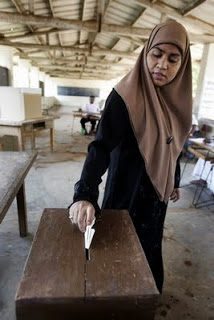
Islam is a missionary religion, and one that doesn’t allow the easy compartmentalising of life into sacred and secular. Even in Western countries, many Muslims aren’t signed up to the ideals of Western liberal democracy and would prefer a Muslim state. On the other hand, many Muslims do agree with Western values and political systems, and don’t agree with the more extreme versions of Islam. We can’t point to one camp or the other and say “that’s the true face of Islam”, and dismiss the other as an aberration, but recognise the reality of both.
If we demonise all Muslims as terrorists and theocrats, then we’ll just increase the polarisation between the two extremes of intolerant secularism and radicalised religious fundamentalism. We need to work to find a common ground which gives faith a voice in the public square, but not a trump card.
Os Guinness argues in his book The Case for Civility that we must say no to a “sacred public square” – where one religion has a position of privilege or prominence that is denied to others. Guinness laments the state of the Religious Right and the damage it has done to faith in America. But at the same time he argues we must also say no to a “naked public square”—the situation where public life is left devoid of any religion. Instead, we need a “civil public square”:
“The vision of a civil public square is one in which everyone—peoples of all faiths, whether religious or naturalistic—are equally free to enter and engage public life on the basis of their faiths, as a matter of ‘free exercise’ and as dictated by their own reason and conscience; but always within the double framework, first of the Constitution, and second, of a freely and mutually agreed covenant, or common vision for the common good, of what each person understands to be just and free for everyone else, and therefore of the duties involved in living with the deep differences of others.”
Os Guinness writes about America, but I think the basic argument can be made for Britain and other Western democracies. Faith can and should be brought constructively into public life, and we need to encourage people of all beliefs – including secularists, atheists and humanists, which are beliefs just as much as any other – to do this.
We need to recognise that, at least in the West, most people of faith, Christian, Muslim and all the many other religions, are willing to enter into civil discussion and engagement. But if we exclude faith from public life, that will drive people increasingly to the extremes.

